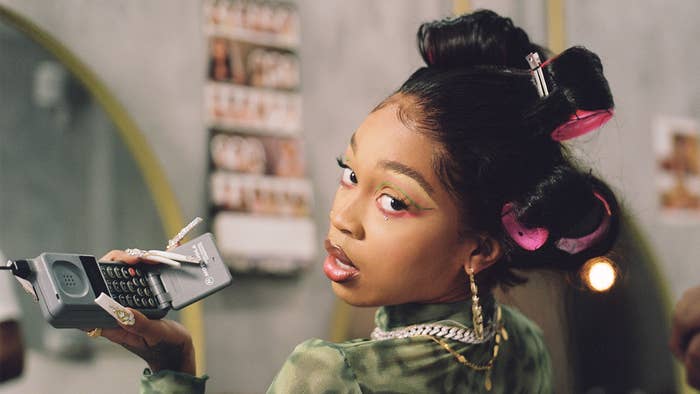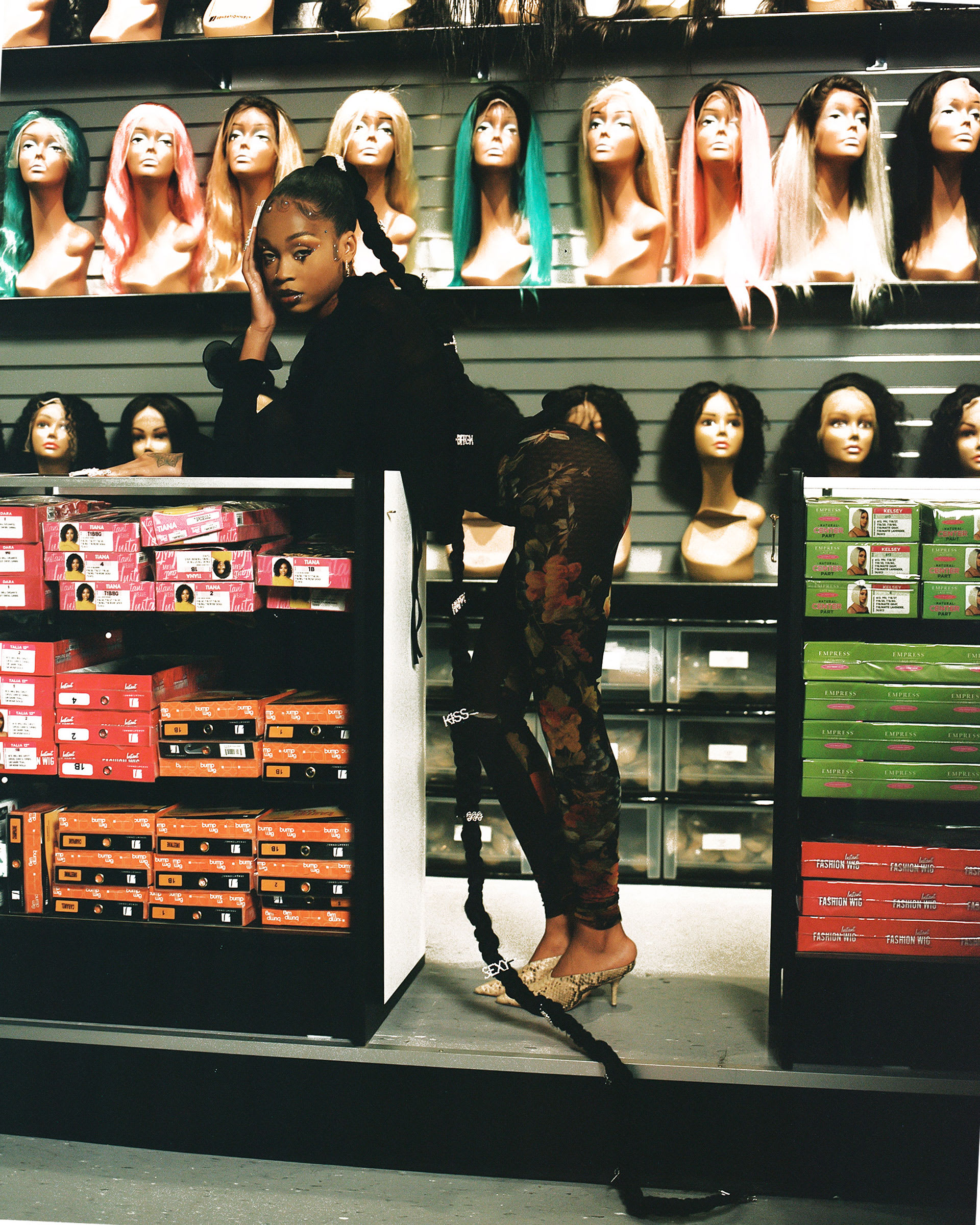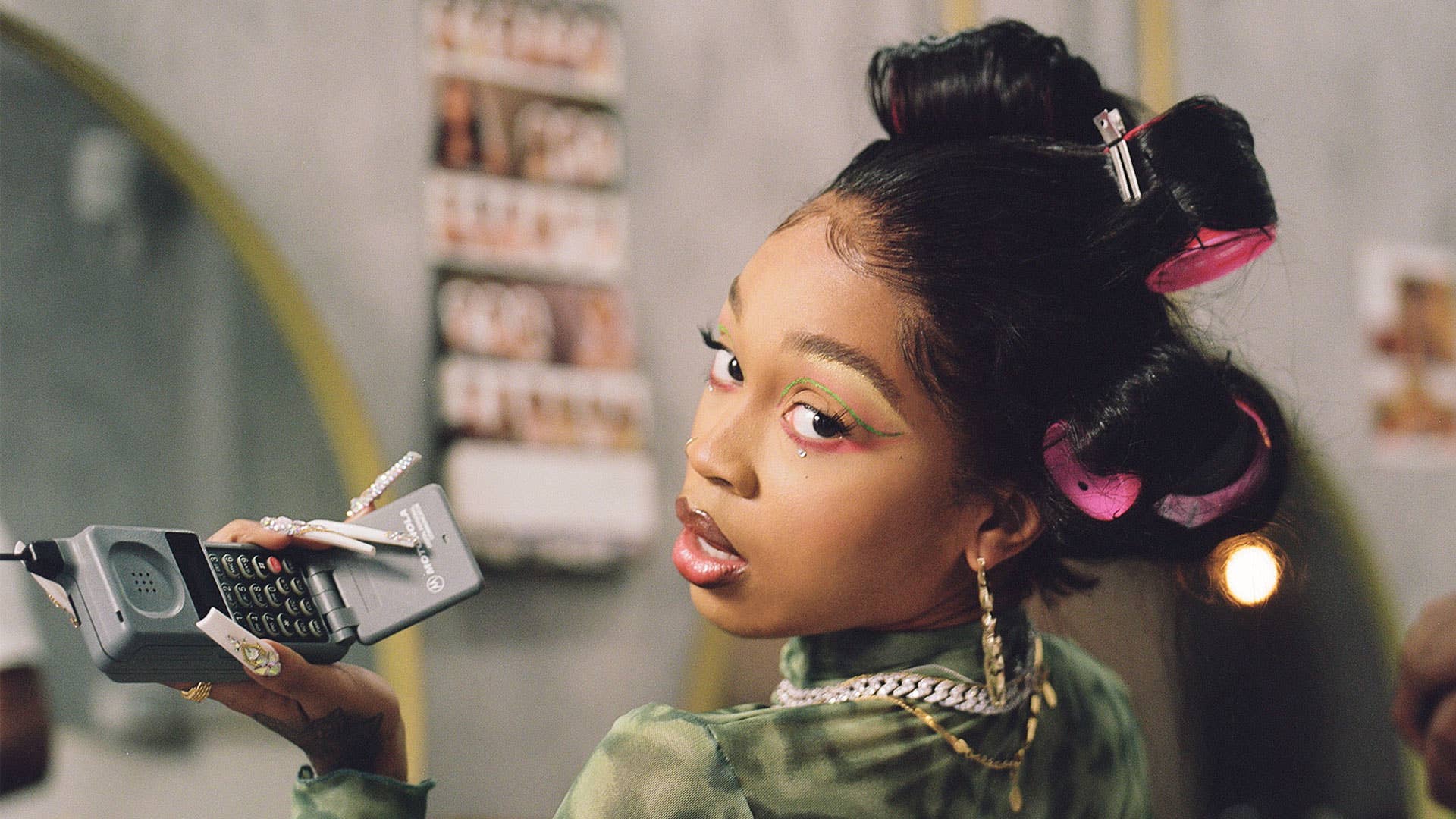
When Toronto singer Ebhoni describes herself as a “hot gyal trying to make it in a cold world,” it’s not just a catchy mantra. The oppositional nature of the phrase is intentional, giving you insight into how Ebhoni’s personality manifests itself in her music, often taking a situation and flipping it on its head. A case in point is her latest single, “X-Ting” from her new EP X, out today.
Brimming with a sonic immediacy that meshes dancehall and R&B over a lilting guitar loop, it’s a song about ignoring being constantly called by an unfaithful ex-partner and his other love interests in the aftermath of a breakup. Ebhoni takes what is actually an unsettling situation—which is belied by the melodic production—and asserts her agency and boundaries, deflecting the situation with humour, allowing her unbothered and unfiltered personality to shine through.
In many ways, “X-Ting” and the rest of X is a musical and personal crystallized snapshot of the 21-year-old singer.
“X is so crazy, because X is like a time for me,” says Ebhoni. “Not only is it about an ex, X is also a time for me where I was still finding myself. I also wanted to put it out because this is who I was. And this is what I was doing in that moment. And I was still trying to figure myself out and still trying to find myself. So I think that’s why this is even just like a big deal for me, because I wasn’t gonna go to drop X, to be honest with you. I was gonna wait until I had the product. But I’m like, I want to drop X, because I want to show people what I really been doing, what I’ve been working on, and how far I’ve come.”
Ebhoni’s path stems back to emulating the vocal stylings R&B singer Keyshia Cole as a child and being entered into her first singing competition at around the age of nine at the CNE in Toronto. Her star potential and stage presence were keenly noted in her subsequent performances, fostering an online following. Her 2017 debut EP Mood Ring, released when she was 17, was an impressive collection of atmospheric R&B. Featuring standout tracks such as “Killing Roses” and “Time,” the eight-track EP garnered critical acclaim, but there was definitely a different sonic approach to her music back then.
“I think only one song on there was like a reggaeton type sound. And honestly, it was one of my favourite songs on that EP,” says Ebhoni. “And I was just like, OK, like, let me try to find a way to merge the two together—R&B and reggae—and make it me.” Naturally drawing on her Jamaican and Antiguan heritage, waking up on Sunday mornings to reggae and soca in her grandparents’ home and growing up in Toronto’s Weston Road neighbourhood, Ebhoni’s sound and persona began to evolve. A steady stream of loosies like “Opps” and “Warning” from 2018 and 2019’s “TGM (Tek Gyal Man)” chart part of that evoution.
“Over the past years, I’ve just kind of been finding the right sound for me,” says Ebhoni. “And it was interesting, because it was around that time, that was also when [the combination of] reggae and Afrobeats kind of started blowing up and becoming a thing. Which was really good, because then producers have learned to merge the two together. So it was really good for me. But then I was just like, ‘How do I make it my own?’” With recent releases like the strident “MIA” and “Hit This,” produced by Izybeats (who woked on Koffee’s “Toast”) that are included on X, it’s clear Ebhoni has already taken some assured steps towards carving out her own inimitable niche. Our interview with her, edited and condensed for clarity, is below.
“I was just like, let me just talk shit. Let me literally just be me and just talk shit.”
“X-Ting” has the feel of one of those slowburn songs released in winter that has the potential to become a big hit in the summer.
When I wrote “X-Ting,” that was my first time in the studio alone. I mean, no producer, and my mom, who’s my manager, she was not there—it was just me and the engineer. And they had sent me a beat pack and that was one of the beats. At the time, I actually went through a breakup; like, every single thing I’m singing in that song actually happened to me. And we just started dancing to the song. I’m like, “Oh, my God, let me just write this to be funny.” Like, I honestly didn’t write it to make people feel good. I just was laughing because at the time, I was actually getting fake pages, which I knew was the girl messaging me a bunch of drama. And I’m like, I can’t like sit here. Let me just laugh it off. Let me talk about my best friends in it. And then at 2 a.m. or 3 a.m., we were dancing to the song. And then it’s so crazy, because really, no one heard it until a year later. And after that, everyone said, “Are you crazy? This has to come out!” So I re-recorded it. It goes back to me writing because I want it to be the rawest form of me as possible. [I want] people to really feel what I’m saying without being like, “Oh, I want to write the song that people feel.” And then it just came out.
Having seen the “X-Ting” video, I noticed there’s a beauty shop theme running through a couple of your videos now (including “TGM” and “MIA”). What you did what you want to represent visually?
Yeah. I think I want my videos to represent me. Like, if I’m being 100 percent honest with you, when I think about the “X-Ting” video, the director [Christine Boachie] is really someone who’s super close to me. And she actually is the one who directed “Opps,” and is really like me. It’s literally people I grew up with in my neighborhood and places I go all the time. I think for me, I just always want to show my lifestyle, things that I’m into, like an art form. So I think the beauty shop is really interesting because I love getting my hair done. I always get my hair done and at the time, I was thinking about cutting my hair and always wore a wig. And we just want to really capture those things. I feel like the video is capturing the realness but in an art form, like [in an] aesthetically pleasing way, you know? But in a way that is so me.

It’s the kind of store that’s a staple in the Black community, but you don’t often see it kind of get elevated in that sense.
Yeah and that’s another thing too, also showing Black culture. I wanted it to be a thing where I put the ’90s magazines up there, because I love the ’90s. I want the ’90s hairstyles. I remember on Saturdays, I used to be so excited when my mom would book hair appointments for us. And I remember going to the hair salon and it being a bunch of Black women doing hair. Like, they would just sit there and gossip. But that really happens at the hair salon, you know? I wanted to tap into my life moments.
“If I really didn’t spend that much time on Weston, if I wasn’t out there talking to the people, would I really be the person I am today? I really don’t know.”
Can you talk a little bit about working with Izybeats, as he produced two of the songs on the EP [“Hit This” and “All To Myself”]? How did that collaboration come about?
I just remember being at home, and Koffee’s “Toast” had just come out and that was a song that I was in love with at the time. And obviously, his tag [“Yo Izy, are you kidding me?”] was one of the best parts of the song. So I remember my mom had came to me and she was like, “Well, they want you to do a session with Izy and Walshy [Fire of Major Lazer].” So I went to Miami for a weekend. I had a two-day session with them and those two songs actually came out of that session. Honestly, the vibe from the beginning was just amazing. I’m a super shy person—super, super, super shy. But just being around them, I felt like I knew them for a long time. I felt like they were like family. And that’s basically how we came up with “Hit This.” And after that, we just kept working together, to be honest. I went back to Miami, and did a few more things with them. But it was so fun. I’ve never experienced any creative process like that, ever. The energy in the room is crazy. And they’re very collaborative. It was just good.
“MIA” is dealing with your self-love and body acceptance. I know it’s a humorous kind of approach to it, but I still think there’s an underlying serious theme to the song. How much does that have to do with just the whole approach of trying to find yourself?
Yeah. It’s so crazy. Mood Ring was still me but I was still figuring myself out. I was like 16, 17. So over time, I’ve kind of found myself learning to accept my body because I am tiny. [Laughs.] Spending some time in Atlanta, a lot of the girls here are bigger—they do have big bums, they do have big boobs. And at one point, I was like, “Damn, like, I want to get surgery.” And I know it sounds so crazy, but like, I have to be honest: that’s really how I felt. And then I was just like, Fuck it, no. Because I actually love my body. And I should actually embrace it. Because what the fuck, like, titties dem small, like, who cares? So, I went in the studio, and I was writing “MIA.” I was just being stupid. I was just like, let me just talk shit. Let me literally just be me and just talk shit. Like, just say whatever comes to my mind. Because I went through a period of time where I was—like, I’m not confident in my body. But then I looked back at photos, and just [remembered] the way I embraced my body. At that time, I was 17. So I was like, Oh my God, I need to go back to doing that. So I was like, let me actually make this a thing for girls, because there are girls out there like me that have small bodies that may or may not feel happy with having small boobs. And I was like, can I just gas ourselves up a little bit? So I gassed myself up a little bit and everyone just really fucked with it and people just related to it.
It kind of just became a thing, because it is a big thing in my life, honestly. I think “MIA” is just so blunt. It’s a happy balance; you feel good moving to it. But when you meet me, I’m a shy person. Even when you get to know me, I’m the goofiest person in the world. I’m also very reserved. I’m very blunt. I’m very straight. And I think that’s why I work so well with Izy and Walshy, because although you have this bounce, it’s like, “How about we try to create or say things that are actually you?” I think creating like that jarring lyric on the happy [beat] is something that I really want to execute on. And they were like, “OK, we need to do this.” And that was also part of “MIA,” I guess it became a little anthem for girls with small tittites.
Artists like Clairmont The Second and Drake with “Weston Road Flows” have talked about the Weston neighbourhood before. What is it about the area in general that’s been important to your creation of yourself as an artist?
It’s like home, if I’m being honest with you. And when I say home, I really mean it in every way possible. And my grandmother recently passed; like really now when I think about Weston, I think about my grandma, because I lived with my grandma for like a year. I went to school on Weston and a lot of my time was spent on Weston. Times where I didn’t even want to be on Weston, I was on Weston. My grandma used to force me to be outside and sit outside with her to 1 a.m. and watch all these people walk past. Literally everyone on Weston knows my grandma. I spent so much time over there like since I was like a baby that these people know me—they watched me grow up. So, it’s just home.
When I think about Toronto, I think about Weston and I think about it in every way. My favorite places are on Weston, a lot of my memories are on Weston, so it’s just, you know, not forgetting about that. And also just kind of shining a light over there because the area is the reason why I am the way I am, you know? Who knows, if I really didn’t spend that much time on Weston, if I wasn’t out there talking to the people, would I really be the person I am today? I really don’t know. If I did not sit there with my grandma, when she told me to sit there, would I be as open to the different types of people, and just understanding where people can come from other situations? I don’t know if I’d be as understanding, to be honest with you. I feel like I’d be very judgmental. And I feel like I learned to accept the people and who they really are. It’s just really deep to me. I can really go on and on about Weston, but it’s just really deep, that place. I think people think, Oh she’s just repping Weston to be cool and it’s literally fucking no. I moved around so much; I went to six different high schools. But even if I went to a different high school, my ass is still on Weston after school, you know what I mean? It’s just so crazy. I always went back.



